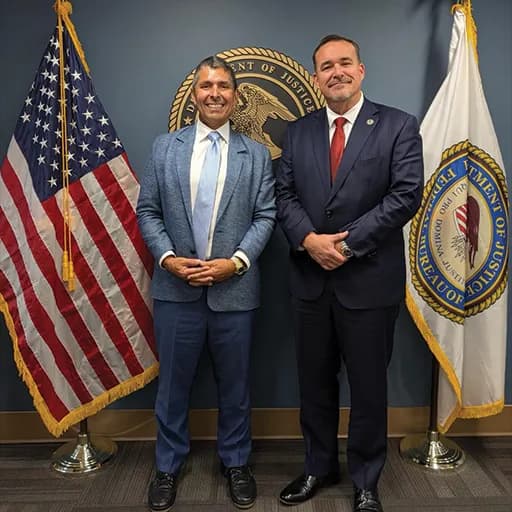Building Pathways to Earn Freedom Through Merit
Across the country, leaders within the Federal Bureau of Prisons (BOP) continue to show openness to new ideas that strengthen the agency’s mission of preparing people for success after release. I’m especially grateful for the leadership of Deputy Director Josh Smith, who consistently invites dialogue on ways we can expand access to self-directed learning resources and evidence-based programming.
Recently, Deputy Director Smith reached out to learn more about the Preparing for Success After Prison (PSAP) course—our nonprofit’s self-directed program that has already helped thousands of justice-impacted individuals begin documenting their preparation for success. His questions focused on practical implementation: how participants receive the materials, how institutions can approve or block access, and how our work aligns with volunteer and contact policies.
Those are exactly the kinds of questions that help us move forward responsibly.
Our Approach: Transparency, Compliance, and Service
When I first created Preparing for Success After Prison, I envisioned a course that any person could complete—whether in a reentry classroom, in the SHU, or during lockdowns when group activities were impossible. The program aligns with the First Step Act’s goal of helping individuals build skills that lead to law-abiding, productive lives.
Each course book focuses on five foundational competencies:
- Writing skills
- Reading comprehension
- Math and reasoning
- Critical thinking
- Self-directed work ethic
Through reading, journaling, and reflection, participants learn how to set values-based goals, measure progress, and prepare for successful reintegration. Importantly, they document their own journey—creating tangible evidence of merit and reform.
When administrators told me that budgets didn’t allow for purchasing books, I made a simple decision: donate them. Our nonprofit—Prison Professors Charitable Corporation—exists to serve. Every book we distribute is sent free of charge to the participant and the institution. Anyone in federal prison can request the course by writing to our designated institutional email addresses or by sending a letter through the mail. Our team orders the book through Amazon, which ships directly to the individual, consistent with BOP mail policies.
Navigating Policy and Partnership
Deputy Director Smith reminded me that, as an approved volunteer inside the system, I must follow all BOP policies regarding communication and contact. I welcome that guidance. My goal has always been to operate transparently, to respect every boundary, and to serve the agency’s mission—not to work around it.
I’ve seen firsthand that the most sustainable progress happens when reform comes from within. The Bureau’s regional directors, wardens, reentry coordinators, and countless staff members across the country continue to demonstrate professionalism and genuine commitment to rehabilitation. Leaders like Andy Matevousian, Misty Starr, Eric Williams, and others have shown what it looks like when administration and community partners work side by side.
Scaling Impact
The Preparing for Success After Prison course began as a Productive Activity under the First Step Act. Today, our nonprofit is working to collect data that could help the BOP advance the course into Evidence-Based status. That designation would allow the Bureau to recognize measurable, documented progress as part of a merit-based framework—giving people in custody more ways to earn freedom through preparation and personal growth.
We already have encouraging signs. From Atwater to Florence, from Danbury to Leavenworth, thousands of individuals have participated in the program. Reentry coordinators regularly use the books to supplement classroom instruction, while others assign them as independent study for people who prefer to work alone. The message is consistent everywhere: when people have the opportunity to prepare, they take it.
A Vision Rooted in Accountability and Redemption
At Prison Professors, our mission is to teach and model the belief that a person’s future should not be defined solely by their past. The principle of earning freedom through merit is more than a slogan—it’s a roadmap. Through self-directed work, consistent documentation, and a commitment to ethical living, every individual can create evidence that they’re ready to reenter society as a law-abiding, contributing citizen.
The Bureau of Prisons has an extraordinary opportunity to lead the nation in showing how preparation, accountability, and data-driven results can strengthen both public safety and human potential. I’m grateful to Deputy Director Smith and his team for engaging in this conversation and for inviting clear dialogue on how we can continue to collaborate responsibly.
Our nonprofit will continue to invest resources, time, and energy into making these opportunities available to every person in federal custody—at no cost, and with total respect for institutional policy.
Moving Forward
As we move toward our next generation of tools—including the scalable Profiles web application that documents each participant’s growth—we remain committed to our guiding belief:
“Excellence is not a gift; it’s a discipline. Those who prepare with purpose earn the trust that leads to freedom.”
Every person in prison can start today by documenting their own progress—through reading, writing, learning, and building a body of work that reflects integrity and accountability. Together, through collaboration with BOP leadership and frontline staff, we can build a system where success is measurable and freedom is earned.
Would you like me to prepare a shorter 300-word version of this same blog suitable for a broadcast email or newsletter, linking back to the full article on your website? That would help maximize visibility and reinforce the “earning freedom through merit” theme.

